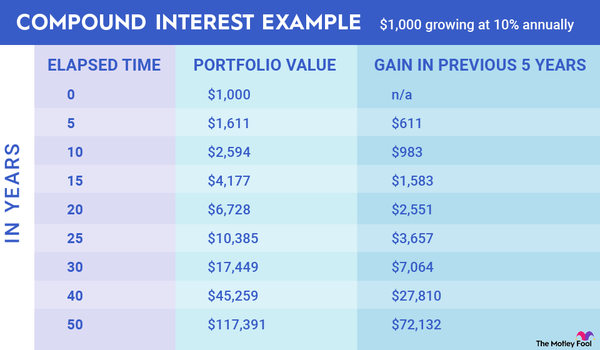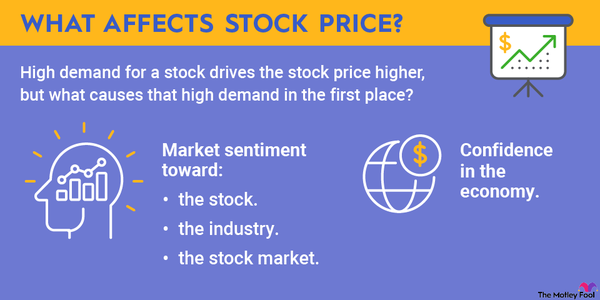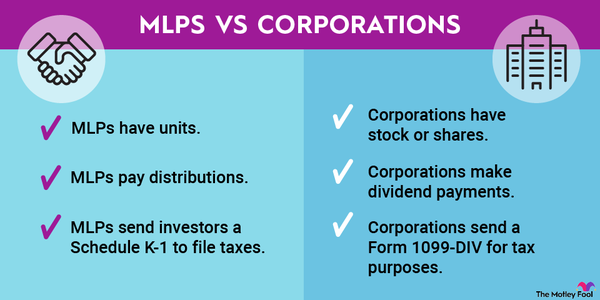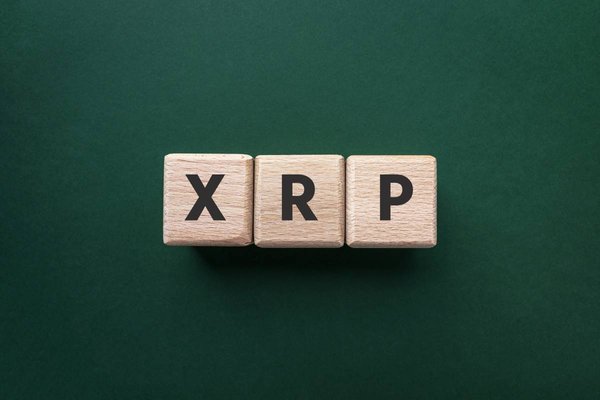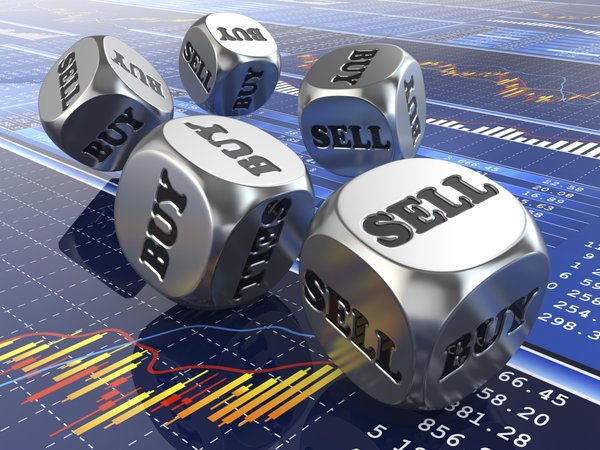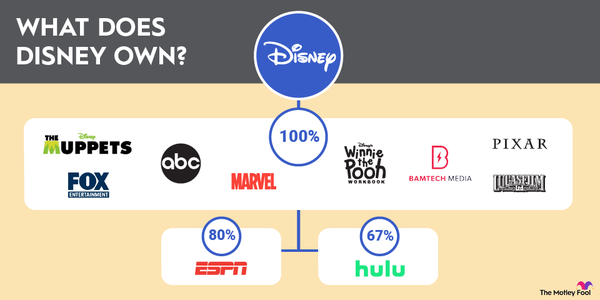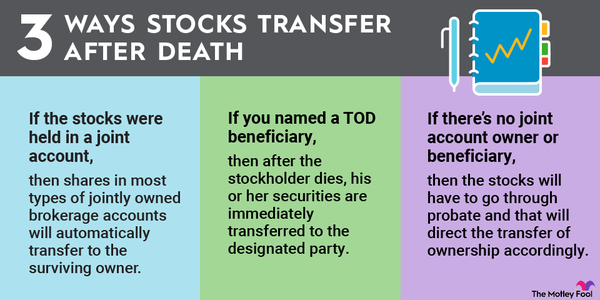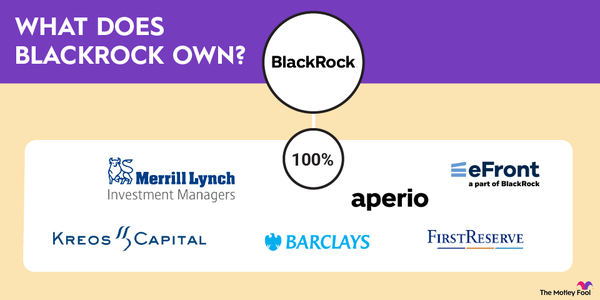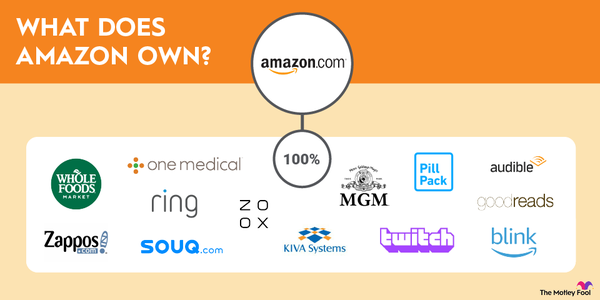Putting money into the stock market can strike fear in some would-be investors. Nobody wants to end up buying right when prices peak. Investing amid a market downturn can be even more gut-wrenching. It's impossible to know whether the worst is over or more losses are yet to come.
So, how do you evaluate when to buy stocks and when to wait for a pullback in the market? The best answer is that you don't. Both passive index fund investors and individual stock investors will likely be better off consistently buying shares and ignoring the daily ups and downs of the market.
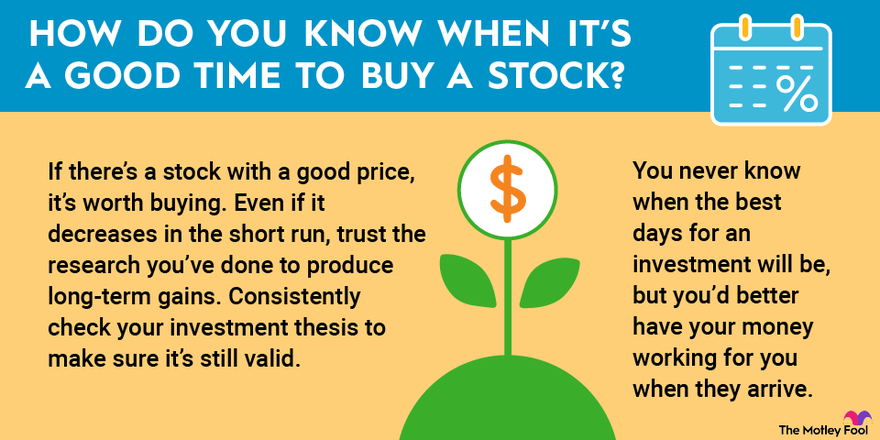
Is now a good time to invest in stocks?
If you're looking to invest for your future -- five, 10, or 40 years from now -- now is as good a time as ever to buy stocks. Despite ongoing recession fears, it's important to remember the market is forward-looking.
Stock values are based on future expected earnings. Despite the occasional gross domestic product (GDP) contractions, earnings tend to rise over the long run. That said, there are still good stocks to buy during a recession.
If you invest consistently over time -- putting more cash into your investments every month or so -- you'll end up catching a correction or a stock market crash on occasion. Those are opportunities to invest even more than usual if you can swing the cash flow.
Cash Flow
Of course, it's not particularly feasible to plan for the unpredictable. If the market could predict a crash in stock prices, a crash would never actually occur.
Buying the dip
Is it better to buy stocks when they are down?
If you like to research stocks, it might be harder to find good buying opportunities when the overall market valuation climbs higher. Fewer stocks will present value relative to their underlying fundamentals, but that doesn't mean those opportunities don't exist.
If you're asking, "Is now a good time to buy a stock?" consider that it's always a good time to invest when you find a security you've determined is undervalued by the rest of the market.
On the other hand, you'll likely find more opportunities to buy shares of undervalued companies during a broad market decline. Those are great opportunities to act on your research and buy shares well below where they were trading just a few months prior.
Warren Buffett once said, "I make no attempt to forecast the market -- my efforts are devoted to finding undervalued securities." For Buffett, the question isn't, "Should I invest in stocks now?" It's, "Which stocks should I invest in now?"
If there's a stock with a good price, it's worth buying. Even if it decreases in the short run, trust the research you've done to produce long-term gains. But don't ignore the company entirely. Consistently check your investment thesis to make sure it's still valid.
Investment Thesis
When to buy or sell
How do you know when it's a good time to buy a stock?
Even buying a growth stock with strong long-term potential near the peak of a bull market run is far from a death sentence. While growth stocks tend to fall much more in price during a correction or crash, those periods can also be catalysts for growth.
Economic events that shake up the stock market often present opportunities for companies with management teams focused on long-term growth opportunities. So, even if your stock tumbles, it could come back even stronger. Uncertain economic times are great opportunities for growth stock investors.
Some investors may be scared off by a small pullback in price, thinking more losses are coming. In fact, it's much more likely to be a correction (a drop of more than 10% but less than 20%) than a market crash (a drop of more than 20%). Stock market corrections happen all the time -- on average, once every other year or so. They can be great opportunities to buy stocks while they're temporarily discounted.
What's the best time of day?
On regular trading days, the stock market is open from 9:30 a.m. ET until 4 p.m. ET. For investors who plan to hold stocks over the long term, it doesn't make much difference what time of day they buy or sell.
Day traders prefer volatility so they can capitalize on price swings throughout the day. That's why you might read that the best time of day to buy and sell stocks is between 9:30 a.m. and 10:30 a.m. or 3 p.m. and 4 p.m. The first and last hours of trading see much more action than the middle of the day.
CBOE Volatility Index (VIX)
It's important to know that day trading and investing are two very different things. Investing is when you buy shares in a company. If the company performs better than anticipated, investors are rewarded with outsize appreciation in their shares.
Day trading is when you buy and sell stocks on the same day without regard for the underlying fundamentals of a company. Both can be profitable, but it's very difficult to become a profitable day trader. It's much easier to become a good investor.
What's the best day of the week to buy and sell stocks?
There's anecdotal evidence that the stock market dips most on Mondays after a bevy of bad news builds up over the weekend. It might also be that people aren't happy to be going back to work on Mondays (i.e., the Monday Effect), leading to a pessimistic stock market.
Monday Effect
But the Monday Effect, or Weekend Effect, as it's also known, has faded to nonexistence over the past 45 years. According to a study by Arizona State University researchers, stock market performance on Mondays has not differed significantly from any other day since 1975. So, go ahead and buy stocks whenever you have the cash.
The corollary of the nonexistent Monday Effect is that there's no best day to sell stock, either. People used to suggest selling on Friday to avoid the probabilistic bad day on Monday, but that strategy doesn't make sense in today's market.
What's the best month of the year to buy and sell stocks?
There's also no shortage of theories and adages about the best month to buy or sell stocks. Maybe you've heard the phrase, "Sell in May, and go away." Or maybe you heard about the Santa Claus Rally. There's also the January Effect, which notes outperformance for certain market segments at the start of the year.
Investors usually sell some stocks at the end of the year as part of their tax planning. They want to lock in losses or take capital gains when it makes sense for tax purposes. That may present an opportunity for investors at the end of December or early January, leading to the January Effect.
But it doesn't make sense to hold cash from May until the end of December just to invest. More likely than not, you'll miss out on stock market gains if you sit on cash, just waiting for an opportunity to enter the market.
Related investing topics
Will stocks go up in 2025?
Why you shouldn't time the market
Some of the best investors in history had no interest in timing the market. Warren Buffett and Peter Lynch have avoided market timing throughout their careers. If they don't recommend doing it, what makes you think you can outsmart them?
Lynch put it rather bluntly:
Far more money has been lost by investors preparing for corrections, or trying to anticipate corrections, than has been lost in corrections themselves.Peter Lynch
Simply looking at a few statistics should show you why attempting to time the market is a big risk. If you invested all your money in an S&P 500 index fund at the start of the century, you'd see an average return of about 6% per year over the next 20 years. That period includes the dot-com stock market bubble and the Great Recession.
But if you missed out on the 10 best days for the index during that period, you'd earn just 2.44% per year. You'd miss out on half the returns of the market. You never know when those 10 days will occur across the 20-year period, but you'd better have your money working for you when they arrive.
FAQ
Buying stock FAQ
Is it a good or bad time to buy stocks right now?
Buying stocks right now is a great decision for long-term investors. While the stock market fluctuates up and down over the short run, it's consistently increased in value over the long run. There's no better time to invest than right now.
What is the 11 a.m. rule in trading?
The 11 a.m. rule states that if a market trend hasn't reversed by 11 a.m. ET, it's unlikely to reverse that day. The rule is based on historic trading patterns. The 11 a.m. rule is only pertinent to day traders. Long-term buy-and-hold investors don't need to concern themselves with the time of day they buy shares.
Is now a good time to invest in the stock market?
Now is as good a time as any to invest in the stock market. Long-term investors with a horizon of years, not days or weeks, will do better to invest their money as soon as they can. The adage "time in the market beats timing the market" is true. Over long periods of time, stocks appreciate faster than inflation.
What are the best months to buy stocks?
The best months to buy stocks are all of them. Waiting for a certain month to buy stocks when you have cash to buy shares now is a losing decision. You're more likely to miss out on gains than you are to take losses if you invest today.












